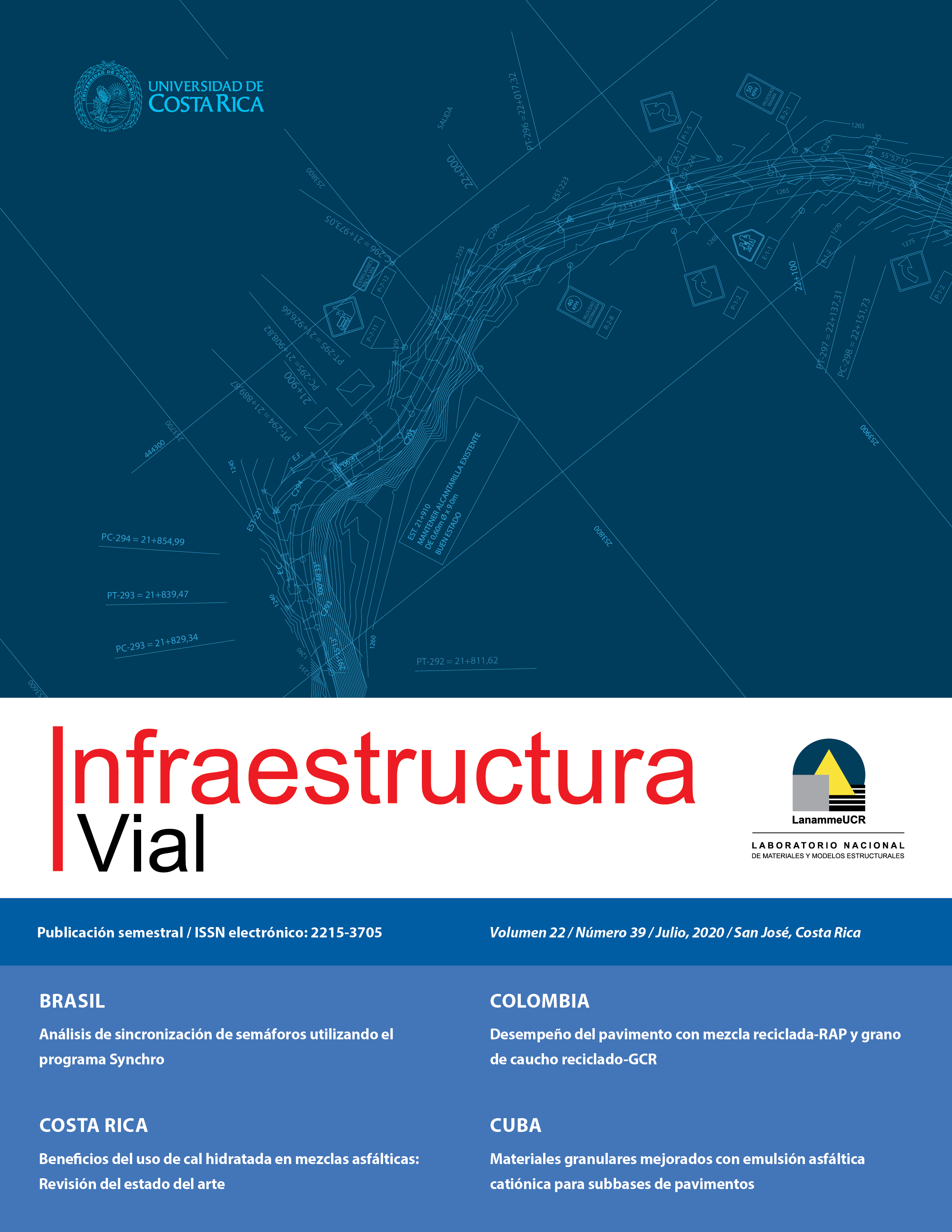Abstract
The use of bases treated with hydraulic binders or asphalt binders has become a common solution in the construction of pavement bases or sub-bases due to the need to achieve high performance, and also because of the increment of the repetitions and magnitudes of loads in transportation. The treatment with additives provides greater resistance and behavior to the pavement layers over time. A granular material was selected with the purpose of evaluating the effectiveness of one of these treatments. This material did not meet the requirements of a road subbase because of its high plasticity. A cationic asphalt emulsion was incorporated to this granular material in order to check the variations that this treatment could experience regarding its resistance in the laboratory. Finally, good results were obtained with this treatment. An increase in resistance to CBR after immersion and conserved resistance were observed. The modifications produced after the treatments, are also shown by comparing a conventional flexible structure and a structure with a stabilized sub-base layer with an emulsion instead of a non-agglomerate traditional subbase, using an empirical-mechanistic procedure of AASTHO Design Guide.
References
American Association of State Highway and Transportation Officials (AASHTO) (1980). Standard Specification for Viscosity-Graded Asphalt Cement. Washington, D.C., Estados Unidos.
American Association of State Highway and Transportation Officials (AASHTO) (2004). Guide for Mechanistic -Empirical Design of new and rehabilitated pavement structures. Washington, D.C., Estados Unidos.
American Association of State Highway and Transportation Officials (AASHTO) (2008). Mechanistic–Empirical Pavement Design Guide. A Manual of Practice. Washington, D.C., Estados Unidos.
Arquié, G. (1971). Compactación en carreteras y aeropuertos. Barcelona, España: Editores Técnicos Asociados.
Balay, J., Correia, A. G., Jouve, P., Hornych, P., y Paute, J-L. (1997). Mechanical Behaviour of Soils and Unbound Granular Materials, Modelling of Flexible Pavements–Recent Advances, Eighth International Conference on Asphalt Pavements. University of Washington, Seattle.
Figueroa, J. A. 2005. Guía para el uso del método de diseño de estructuras de pavimento nuevos según método de la AASHTO 2002 (Tesis Doctoral). Universidad de El Salvador, El Salvador.
Fonseca, A. (2001). Ingeniería de pavimentos para carreteras (2da ed.). Santa Fe de Bogotá, Colombia: Universidad Católica de Bogotá.
Instituto Nacional de Vías. Normas y Especificaciones. INVIAS, (2012). Recuperado de: https://www.invias.gov.co/index.php/informacion-institucional/139-documento-tecnicos
Ministerio de Transporte y Obras Públicas (2002). Especificaciones Generales para la Construcción de Caminos y Puentes (MTOPT 001-F-2002). Recuperado de: https://www.obraspublicas.gob.ec/wp-content/uploads/downloads/2013/07/01-07-2013_ConcursoPublico_StoDomingo-Esmeraldas-Especificaciones-Tecnicas.pdf
Muñoz, J. M. (1983). Un método sencillo para determinar las propiedades reológicas del betún en el intervalo 45-75°C. El ensayo del flotador. Carreteras, (8), 20-25.
Nerveda, J. (2015). Mezclas bituminosas en frío. Grava-emulsión. Asociación Técnica de Emulsiones Bituminosas. Recuperado de: https://www.ateb.es/images/pdf/1MEZCLAS.pdf
Pérez, F. E. (1998). Documento de referencia para el reciclado: especificaciones, normativa y recomendaciones. Situación actual y necesidades. IV Congreso Nacional de Firmes. Junta de Castilla y León, Segovia.
PROAS (2013). Grava-emulsión. Manual de consulta. Recuperado de: https://www.cepsa.es/stfls/CepsaCom/PROAS/Ficheros_proas/Grava-emulsion.pdf
Sánchez, J., Perez, F., Miro, R., y Paez-Dueñas, A. (1998). Reciclado en frío con emulsión de las capas asfálticas de la carretera C-147, tramo Sort-Esterri D’aneu. Control de ejecución: seguimiento y análisis. IV Congreso Nacional de Firmes. Junta de Castilla y León, Segovia.
Tejeda, E. (1999). Investigación sobre el comportamiento en laboratorio de las mezclas bituminosas recicladas con emulsión. Bases para un nuevo método de formulación (Tesis Doctoral). Universidad Politécnica de Madrid, España.


